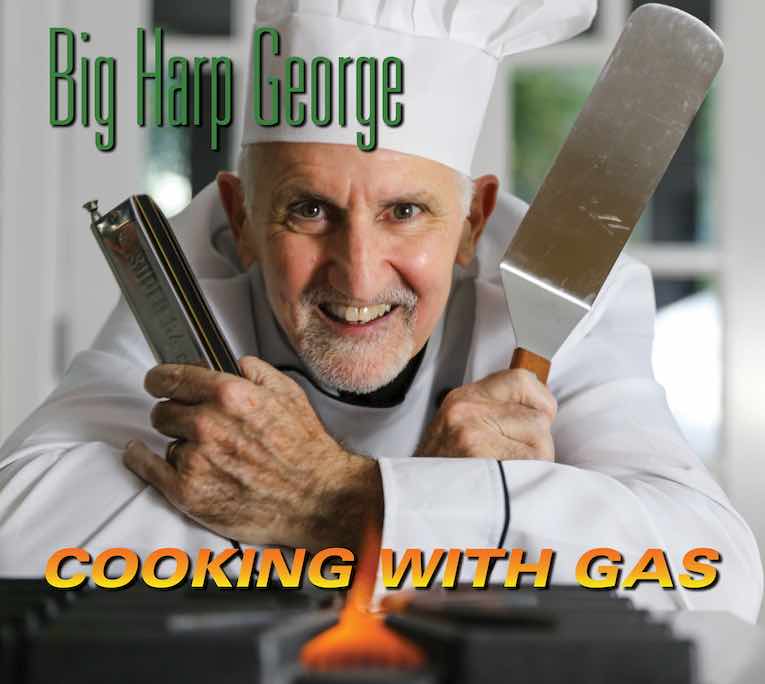
Review: Big Harp George ‘Cooking with Gas’
By Jim Hynes
Sometimes the second career or avocation can be far afield from the primary one. Every so often a bluesman appears from an unlikely background. Big Harp George is a prime example although he is not new to the blues. The singer-songwriter and chromatic harmonica ace (George Bisharat) is releasing his seventh album titled Cooking With Gas.
Prior to establishing George’s musical career he was a criminal defense attorney, award-winning professor of law at UC College of the Law, San Francisco, and expert commentator on law and politics in the Middle East. His background gives him source material that few blues artists possess. That, coupled with an enthusiastic sense of humor, mastery of the chromatic, rather than the customary blues staple, the diatonic harmonic, make Big Harp George (BHG) a special cat. He’s also made a smart business decision by linking up with Kid Andersen’s Greaseland crew, not only in terms of production but in gaining access to a great backing band.
The chromatic harmonica is found more often in jazz than blues and thereby gives BHG’s music a bigger umbrella to include soul, funk, blues, and jazz. Thus, we find fourteen musicians and singers in the credits, some just on select tracks augmenting a core band of guitarist Andersen and drummer Derrick D’Mar Martin (half of Rick Estrin’s Nightcats), keyboardist Chris Burns, trombonist Mike Rinta, saxophonist Michael Peloquin, baritone saxophonist Doug Rowan, and bassist Joe Kyle Jr. The Sons of the Soul Revivers (James, Dwayne, and Walter Morgan) sing on all but three tracks. This aggregation of talent is rare, especially on a blues album. Rinta is a first-class arranger, and was behind Taj Mahal’s 2023 jazz album, Stompin’ at the Savoy.
Opening with the funky facetious title track, BHG compares his love life to the phasing out of his gas stove as Burns rollicks on piano and the three-piece horn section blasts away. His satirical stance also runs through the swinging jazz on “Cellphone Hater 2.0,” with a brimming chromatic solo that fits tightly with the swaying horns. Rowan’s bari sax lays down a fat bottom, trumpeter Ed Morrison joins the horn section and Martin shifts to percussion on the Latin flavored “Doom Loop,” a horn slathered, animated dance number with BHG’s harp soaring.
The vibe shifts to vintage R&B, Amos Milburn style, in “Wine Is My Friend,” especially imbued by “The Sons” doo-wopping on the choruses. Peloquin wrote the instrumental funk rave-up “Maceosity,” nodding to James Brown’s musical director Maceo Parker, Fred Wesley, and those Famous Flames that backed the soul icon. Burns rocks out on the electric keys, and once again BHG proves his mettle in another musical context. Soloists Rinta and Peloquin (here on a diatonic harp, so note how that differs with the chromatic), and Rowan stretch out. That sturdy bassline comes courtesy of soul/blues/R&B icon Jerry Jemmott, who also plays on the rhumba “DIY Mama.”
BHG pokes fun at himself in “Awkward Me,” the band sounding like a big band from the ‘30s, with Rinta taking the lead. The title and the melody on “What the Missus Misses” is straight out of early ‘60s television, another vibrant swinger for the band, guaranteed to bring smiles. The instrument “June’s Tune” is for drummer June Core, a fixture in Charlie Musselwhite’s West Coast bands. He plays here along with former Musselwhite bandmate Andersen who shifts to upright bass, with a brief solo too. “Paradise Burning” is one of the few core blues songs here, again strengthened by the harmonies of The Sons.
BHG’s trademark wit is on display “The Older I Get,” which features one of his best turns on the chromatic, with Rinta and The Sons shining here as well. Closing with the tender “When I First Met Valerie” Big Harp George coaxes wonderful tone from his chromatic, delivering the melody as sweetly as one might equate with Johnny Hodges in Ellington’s band. Burns adds a steady, bluesy touch on the acoustic piano and the horns swell lightly in support.
To say Cooking With Gas is Big Harp George’s finest effort to date is no stretch. The pacing of the album through different musical styles, coupled with his songwriting make this a can’t miss effort, especially with this talented group of musicians backing.
“Cooking With Gas”
Big Harp George website

What a fun song! Love the lyrics, great horns, has me dancing around the kitchen!